2024 Wellness Summit
The Lawrenceville School
2500 Main StreetLawrence Township, NJ 08648
United States
Morning Keynote: Belonging Means Health

Justine Ang Fonte, M.Ed, MPH
Humans are wired to connect. So when we feel disconnected, we lean on food, substances, and technology. Is that last sentence the basis of your school's health & wellness curriculum? If it is, that tracks because nutrition, drugs, and digital citizenship are necessary topics to cover in school. But are they effective if it's reactive instead of preventive? Missing from many schools is how we inspire empathy, promote agency, and disrupt the forces that take advantage of our evolutionary needs of connection. This session will explore the ways in which schools can rethink power and agency in order to provide a pathway for all students, faculty, and staff to recognize, embrace, and celebrate their most authentic selves. It is with such individual autonomy that schools can engender healthy and well communities.
Afternoon Keynote: How Diverse Communities of Young People Think About the Multifaceted Relationship Between Social Media and Mental Health
Presented by: Jasmine Hood Miller
This session explores the complex impact of social media on the mental health of young people,particularly those from marginalized communities. A collaborative study between Common Sense Media and Hopelab highlights both the benefits and challenges young people experience online, including emotional support and community building alongside exposure to harmful content. The session emphasizes the need for further research, education, and action to ensure social media platforms prioritize youth well-being. Educators will learn strategies for supporting students who use social media, while advocating for safer online spaces that prioritize the well-being of all youth.
When she's not trying to find fun ways to keep her three young children happy and healthy, Jasmine enjoys spending time with family, DIY projects, traveling, and being a plant (and fur) parent.
Agenda
| November 13 | |
| 8:30 AM - 9:00 AM | Check-in and Breakfast Location: Abbott Dining Hall |
| 9:00 AM - 9:15 AM | Welcome Location: Abbott Dining Hall |
| 9:15 AM - 10:15 AM |
Morning Keynote: Belonging Means Health
Presented by Justine Ang Fonte Location: Abbott Dining Hall |
| 10:15 AM - 10:45 AM |
Fireside Chat with Justine Ang Fonte
Facilitated by Ayanna Hill-Gill, ADVIS President Location: Abbott Dining Hall |
| 11:00 AM - 12:00 PM | Morning Workshops Concurrent Sessions |
| 12:00 PM - 1:00 PM | Lunch Location: Abbott Dining Hall |
| 1:15 PM - 2:00 PM |
Afternoon Keynote: How Diverse Communities of Young People Think About the Multifaceted Relationship Between Social Media and Mental Health
Presented by: Jasmine Hood Miller Location: Abbott Dining Hall |
| 2:15 PM - 3:15 PM | Afternoon Workshops Concurrent Sessions |
Presented by:
Erin O'Connell, Director, Faculty Development and Mentoring
Cathi Spampinato Pappano, Compensatory Skills teacher
The Pennington School
Description:
We believe that teachers who are in supportive environments thrive. Peer-led Mentoring/Coaching provides avenues for teachers to receive non evaluative feedback and guidance, and ensure a sense of belonging. In a growth-oriented learning community, teachers can create a nurturing network that enhances job satisfaction, boosts retention, and fosters continuous learning. At the heart of a vibrant mentoring program is the onboarding process. We will outline key questions to consider that will encourage you to identify the guiding values of your school, and how to communicate these values to new faculty and staff. How to integrate values with practices along with the individual excellence of the teacher in other words, how to align the authentic self of the teacher with the values of the school community is what makes for successful connected, and yes, happy teachers, a vibrant learning community and thus successful students. The advantages of mentoring include building a supportive network, increasing job satisfaction and retention, promoting continuous learning, and encouraging the sharing of best practices. Through modeling, break-out groups, and discussions, participants will leave with the next steps to imagine a new program or enhance one that may already exist.
About the Presenters:
Erin O’Connell, Director of Faculty Development and Mentoring, along with fellow mentors Jamie Moore, Middle School teacher and hall parent, and Cathi Spampinato Pappano, Compensatory Skills teacher, work together to onboard, and orient new faculty, intentionally focusing on School culture, fostering understanding of learning styles, building community, well-being, and pedagogical, and reflective practices. Together they leverage their pedagogical and institutional knowledge to strengthen and connect the school environment, aligning individual's interests and the School’s mission. With over 15 years in education Erin, Jamie, and Cathi serve as mentors supporting faculty from onboarding new faculty to contributing to PD opportunities.
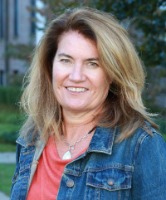 |
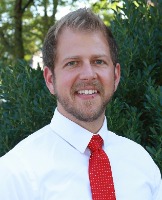 |
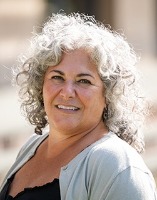 |
| Erin O'Connell | Jamie Moore | Cathi Spampinato Pappano |
Target Audience: Middle School teachers, Upper School teachers, Administrators, School Counselors and Psychologists, Learning Support staff, Deans of Students
Presented by:
Kimberly Polonsky, Director of Student Support & Upper School Counselor
Agnes Irwin School
Description:
Implementing a peer-led social emotional curriculum in high schools is crucial for fostering a supportive and inclusive learning environment. High school students face diverse challenges ranging from academic stress to social pressures, and a peer-led approach can effectively address these issues. Peer mentors, trained in social emotional learning (SEL) techniques, can serve as relatable role models who understand the daily struggles and emotions of their peers. During this session we will discuss the struggles that adults have implementing SEL curriculum. We will discuss the benefits of the peer led model and how this allows students to share personal experiences and coping strategies. Peer mentors can help normalize emotions and encourage open dialogue about mental health. We will discuss collecting student data to determine what topics should be covered and the types of activities that can be implemented. Participants will engage in a few of the activities and leave with some lessons that they can use to create and implement their own peer led programs. Peer-led initiatives promote leadership and responsibility among students, enhancing their confidence and sense of belonging within the school community. By investing in peer-led social emotional curriculum, schools can nurture a supportive culture that prioritizes holistic student development and mental health ultimately preparing students for success in academics, relationships, and future endeavors.
About the Presenter:
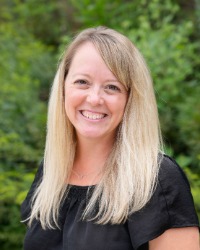
Kimberly Polonsky, MSW, LCSW, BC-TMH, is a Licensed Clinical Social Worker, Board-Certified Telemental Health Specialist, Certified School Social Worker, and Certified School Counselor with over twenty years of experience in child mental health and education. She currently serves as the Director of Student Support at The Agnes Irwin School (AIS) in Bryn Mawr, Pennsylvania where she oversees a dedicated team of learning support professionals and school counselors. In addition to her leadership role, she directly supports students in grades 9-12 as the Upper School Counselor and teaches Intro to Psychology to juniors and seniors.
In parallel with her role at AIS,Kimberly is an adjunct professor and the owner of a private counseling practice, where she provides therapeutic support to adolescents, adults, and couples. She is committed to enhancing the well-being of her clients and creating impactful change in her community. Her practice also partners with Open Path, offering low-cost counseling services to adults who are uninsured or face financial barriers to care.
Throughout her career, Kimberly has spearheaded several successful initiatives. In a large public school district, she created and led a mentor program that connected students, faculty, and staff to foster academic success and personal growth. At AIS, she developed a peer-led social-emotional curriculum for 9th and 10th graders to address key developmental issues affecting their performance and well-being both in and out of school. In addition, she established a Mental Health Awareness Series for parents to provide valuable education and resources on adolescent development.
Beyond her professional work, Kimberly is an active volunteer with Small Things Philly, helping to provide meals to homeless and low-income individuals in the Philadelphia area. She is also a proud mother to three children: Mady, a college freshman; Ethan, a high school sophomore; and Aubrey, a second grader. In her free time, she enjoys reading, dining out, swimming with dolphins, and engaging in volunteer work that strengthens her community.
Target Audience: Early Childhood and Lower School teachers, Middle School teachers, Upper School teachers, Administrators, School Counselors and Psychologists, Learning Support staff
Presented by:
Elaine Griffin, Head of Middle School
University School of Milwaukee
Description:
After the COVID-19 pandemic, schools allocated significant resources to address the spike in anxiety among students. They implemented mindfulness and meditation programs into their curriculum in the hope of easing student anxiety. But what have educators done to help students draw the fundamental distinction between debilitating anxiety (a clinical malady) and the natural anxiety that arises during stressful situations? While wellness practices can support student wellbeing, they cannot prevent negative feelings. In this presentation, I’ll focus on how educators can expand students’ understanding of their emotional lives so that they don’t conflate mental health with feeling good. I’ll challenge conventional views on anxiety by drawing upon research demonstrating that anxiety can be a helpful human emotion fostering resilience and growth; only when students wrestle with and navigate through anxiety do they build resilience. Finally, I will share vocabulary and techniques that my school uses to help students develop strategies for dealing with anxiety in healthy ways.
About the Presenter:
 Elaine Griffin is the head of middle school at University School of Milwaukee in Wisconsin, where she previously served as an upper school English teacher and as assistant head of upper school. She writes a monthly parent-education column for Intrepid Ed News.
Elaine Griffin is the head of middle school at University School of Milwaukee in Wisconsin, where she previously served as an upper school English teacher and as assistant head of upper school. She writes a monthly parent-education column for Intrepid Ed News.
Target Audience: Early Childhood and Lower School teachers, Middle School teachers, Upper School teachers, Administrators, School Counselors and Psychologists, Learning Support staff, Deans of Students
Presented by:
Amanda Hendricks, Yoga Teacher (Specialist K-12)
The Quaker School at Horsham
Description:
As schools seek to address health and wellness issues in schools, it is an opportune time to consider the benefits of a holistic yoga program. While many schools are integrating yoga and mindfulness into their school communities, few have taken steps to create a comprehensive program that supports students’ changing needs and growth over time. The Quaker School at Horsham has done exactly that. This experiential workshop will present an overview of The Quaker School at Horsham’s distinctive yoga program for children with complex challenges, which include a range of disabilities, cognitive diversity, and executive function issues. Participants will learn how yoga, mindfulness, and holistic yoga therapy practices can integrate into a school-based setting and how this particular program adapts practices to support the wellbeing of children with executive function issues. The presentation will also demonstrate how faculty collaboration, training, and practice can create a positive impact on community wellness, especially when implementing a holistic model of yoga instruction and yoga therapy practices which address wellness through physical, emotional, intellectual, spiritual, and breathing practices and techniques. Participants will also explore the wellness needs of their school communities and how a customized yoga program could support those needs.
About the Presenter:
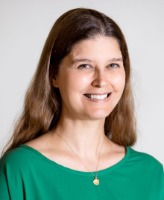 Amanda Hendricks, MA, is a Certified Yoga Teacher with Yoga Alliance (E-RYT, RCYT, YACEP), Holistic Yoga Therapy Apprentice with PIES Fitness Yoga Studio, and full-time Yoga Teacher (Specialist K-12) at The Quaker School at Horsham in Pennsylvania. Amanda has over 10 years experience teaching yoga, mindfulness, and art in schools and community spaces. She specializes in adaptive yoga for kids, teens, and families and yoga for individuals with disabilities. A storyteller and trained art historian, Amanda also has over 10 years of success as a grant writer and consultant for school-based art, education, yoga and mindfulness, and social service programs.
Amanda Hendricks, MA, is a Certified Yoga Teacher with Yoga Alliance (E-RYT, RCYT, YACEP), Holistic Yoga Therapy Apprentice with PIES Fitness Yoga Studio, and full-time Yoga Teacher (Specialist K-12) at The Quaker School at Horsham in Pennsylvania. Amanda has over 10 years experience teaching yoga, mindfulness, and art in schools and community spaces. She specializes in adaptive yoga for kids, teens, and families and yoga for individuals with disabilities. A storyteller and trained art historian, Amanda also has over 10 years of success as a grant writer and consultant for school-based art, education, yoga and mindfulness, and social service programs.
Target Audience: Administrators, School Counselors and Psychologists, Deans of Students
Presented by:
Erin Hoffman, ALEP, Senior Project Manager
Chris Linkey, Partner
RLPS Architects
Description:
Now more than ever, teachers and administrators are being asked to respond to the needs, including emotional and mental health, of the whole child in an academic setting. This session will highlight how architects are helping to address this reality by planning and intentionally designing school buildings to support a child's holistic wellness and also meet the needs of today's educators. Speakers will introduce the term ""Trauma Informed Design"" and share the guiding principles of this design focus. They will share how trauma informed design principles make it possible to create safe and welcoming environments that are educationally focused for educators yet mentally and emotionally supportive for students. The speakers will introduce the concept of biophilic design and discuss its critical role in fostering healthy and effective learning environments. They will demonstrate how these and other intentional design choices contribute to creating ideal learning environments where teachers can teach effectively, and students can thrive. The speakers encourage audience participation and welcome questions for further dialogue.
About the Presenters:
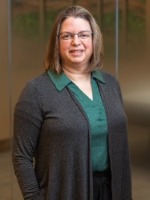 Erin Hoffman is a Graduate Architect and an Accredited Learning Environments Planner with more than 24 years of experience. She received her Bachelor of Architecture from Roger Williams University. Erin focuses on a holistic approach to educational programming, identifying each client’s education philosophy and the pedagogies that support their platform.
Erin Hoffman is a Graduate Architect and an Accredited Learning Environments Planner with more than 24 years of experience. She received her Bachelor of Architecture from Roger Williams University. Erin focuses on a holistic approach to educational programming, identifying each client’s education philosophy and the pedagogies that support their platform.
 Chris Linkey, AIA, is a Partner at RLPS Architects with over 30 years of experience in K-12 education planning and design. He received his Master of Architecture from Savannah College of Art and Design. Chris specializes in developing individualized designs to meet educational program goals while positively impacting the student learning environment.
Chris Linkey, AIA, is a Partner at RLPS Architects with over 30 years of experience in K-12 education planning and design. He received his Master of Architecture from Savannah College of Art and Design. Chris specializes in developing individualized designs to meet educational program goals while positively impacting the student learning environment.
Target Audience: Administrators, Deans of Students, Cafeteria Staff; Staff/Faculty focused on Sustainability, Diversity, Equity & Inclusion and/or Community Engagement
Presented by:
Meg Lembo, Director of Outreach at Share My Meals
Rebecca Herrmann, Regional Wellness Director, Mid-Atlantic at FISD
Cymone Williamson, Director of Community Connections & Belonging at The Peck School
Description:
Your students, faculty and staff spend a sizable portion of each day enjoying meals in your dining hall. Food service providers work hard to positively impact the school community’s physical wellness through healthy meals. But what may not be as apparent are the ways in which the structure of meal times and your school community’s engagement with surplus food after lunchtime ends can help to create a healthier and happier environment across campus and beyond. The Peck School’s student-council influenced family dining structure, FISD’s nutritional guidance and sustainability-focused initiatives and Share My Meals’ meal recovery program are collectively creating a positive impact on the school community’s physical, mental and emotional well being. In this session, participants will learn about these replicable initiatives that have already made a tremendous positive impact at Peck and are being leveraged to have an even more amplified effect in the future. Session facilitators will provide insight into the steps that brought Peck to their current structures and systems, practical resources that allowed them to get there and quantitative and qualitative research and results that support their strategies.
About the Presenter:
Meg Lembo is Share My Meals' Director of Outreach. She is responsible for bringing new meal donors and nonprofit recipients into the Share My Meals family, ensuring that the 10,000+ meals that are recovered monthly are getting to those directly supporting local communities. Prior to her work at Share My Meals, Meg was an elementary school teacher and principal in New York City and a coach supporting schools across the country. She lives in Morristown with her family and proudly transports meals from The Peck School, Gill St. Bernard’s School and The Pingry School to those in need.
Target Audience: Early Childhood and Lower School teachers, Middle School teachers, Upper School teachers, School Counselors and Psychologists, Learning Support staff
Presented by:
Leah Halka, Licensed Clinician/Counselor
The Lawrenceville School
Description:
Emotion Regulation is an imperative skill that helps children/adolescents (and adults!) to thrive and reach their full potentials. Understanding what emotional regulation means can better help you to be able to share and support the development of these skills with students. This presentation will provide an overview of emotional regulation and dysregulation, explore how social media has impacted people’s ability to regulate their emotions, and will review concrete tools and strategies to help scaffold and build healthy emotion regulations skills. These skills can be applies adapted for students of all ages (and adults!).
About the Presenter:
Leah Halka is a NJ, Licensed Clinical Social Worker who joined Lawrenceville’s counseling team in 2023 with experience working with children, adolescents, and their families. Prior to joining The Lawrenceville School, Ms. Halka served in various clinical roles overseeing crisis programs, school-based mental health services and therapeutic school programming, while also maintaining direct work with children and families as a clinician. Leah earned a MSW from NYU with a primary focus in adolescent mental health. Ms. Halka has significant training in trauma-informed care modalities, CBT, DBT, crisis management techniques/strategies, and is currently working on her EMDR certification.
Target Audience: Middle School teachers, Upper School teachers, Administrators, School Counselors and Psychologists, Learning Support staff, Deans of Students
Presented by:
Carla Levins, Assistant Director of Community Services
Joseph Kelly, Director of Programs at Peter's Place: Center for Grieving Children and Families
Description:
This workshop is designed for educators and school professionals to enhance the support of grieving students. Participants will engage in a discussion about grief in society and culture and explore how that shapes the support of the bereaved, while learning about the various ways in which grief is expressed by children. This session also offers the opportunity to review process and procedures that will enable the formation of a grief sensitive school environment.
About the Presenters:
 Carla Levins, LCSW, CT, obtained her Master of Social work from New York University. She has worked exclusively in the field of bereavement for over 13 years and has presented at many conferences throughout her career. Carla leads the Professional Development program at Peter’s Place, creating content and providing professional guidance to area schools regarding best practices to support grieving students and the school community at large.
Carla Levins, LCSW, CT, obtained her Master of Social work from New York University. She has worked exclusively in the field of bereavement for over 13 years and has presented at many conferences throughout her career. Carla leads the Professional Development program at Peter’s Place, creating content and providing professional guidance to area schools regarding best practices to support grieving students and the school community at large.
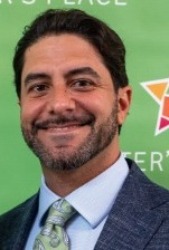 Joseph Kelly, LPC, has served as the Director of Programs at Peter’s Place since 2018. He earned a Master’s degree from West Chester University in Clinical Psychology and has over 15 years' experience working in secondary and higher education settings, with adolescents, teens, and young adults. He has supported over 40 schools through postvention services, following a death in their community, and has provided presentations and trainings to hundreds of mental health professionals and community members on childhood bereavement.
Joseph Kelly, LPC, has served as the Director of Programs at Peter’s Place since 2018. He earned a Master’s degree from West Chester University in Clinical Psychology and has over 15 years' experience working in secondary and higher education settings, with adolescents, teens, and young adults. He has supported over 40 schools through postvention services, following a death in their community, and has provided presentations and trainings to hundreds of mental health professionals and community members on childhood bereavement.
Target Audience: Middle School teachers, Upper School teachers, Administrators, School Counselors and Psychologists, Learning Support staff, Deans of Students
Presented by:
Caroline Graham, Upper School Mental Health Counselor
Alyson Kurz, Upper School Learning Specialist
Episcopal Academy
Description:
In a world filled with pluralistic contention, schools play a vital role in fostering a sense of belonging for all students. This session will explore how integrating the independent school framework for civil discourse can positively impact student mental health. Grounded in the three pillars—commitment to expressive freedom, disciplined non-partisanship, and intellectual diversity—we will examine how these principles encourage students to engage thoughtfully and respectfully in challenging conversations. By equipping students with the tools to navigate differing viewpoints, educators can help cultivate a learning environment where every student feels honored and valued. This session will emphasize the importance of initiating courses or programs in independent schools that prioritize these skills, ensuring a supportive and inclusive community. Participants will leave with strategies to promote civil dialogue, ultimately fostering student well-being and resilience.
About the Presenters:
 Caroline Graham has been a valuable member of The Episcopal Academy community for the past 4 years, bringing a wealth of knowledge and experience from clinical and private practice, psychiatric settings, and residential schools. Her approach centers on providing a supportive space where students feel empowered to express their emotional experiences. With a deep commitment to student well-being, Caroline focuses on fostering environments that encourage emotional openness and growth. Her diverse background equips her to understand the unique challenges students face, and she is dedicated to helping each individual thrive academically and personally.
Caroline Graham has been a valuable member of The Episcopal Academy community for the past 4 years, bringing a wealth of knowledge and experience from clinical and private practice, psychiatric settings, and residential schools. Her approach centers on providing a supportive space where students feel empowered to express their emotional experiences. With a deep commitment to student well-being, Caroline focuses on fostering environments that encourage emotional openness and growth. Her diverse background equips her to understand the unique challenges students face, and she is dedicated to helping each individual thrive academically and personally.
 Alyson Kurz has been a dedicated educator at The Episcopal Academy for 12 years, serving as a learning specialist. She is passionate about fostering student success through meaningful relationships and a collaborative approach to learning. By acting as a partner in each student’s educational journey, Alyson strives to empower students to reach their full potential, particularly those who face learning challenges. Her approach emphasizes creating an inclusive environment where all learners feel valued, supported, and capable of achieving their goals. Alyson believes that a strong foundation of trust and partnership is essential for academic growth and personal development.
Alyson Kurz has been a dedicated educator at The Episcopal Academy for 12 years, serving as a learning specialist. She is passionate about fostering student success through meaningful relationships and a collaborative approach to learning. By acting as a partner in each student’s educational journey, Alyson strives to empower students to reach their full potential, particularly those who face learning challenges. Her approach emphasizes creating an inclusive environment where all learners feel valued, supported, and capable of achieving their goals. Alyson believes that a strong foundation of trust and partnership is essential for academic growth and personal development.
Target Audience: Upper School teachers, Administrators, School Counselors and Psychologists, Deans of Students, College Counselors
Presented by:
Tim Cross, Associate Director of College Counseling & Lower School Level Director The Lawrenceville School
Description:
One of the larger purposes of college admission counseling is to help ripen students into the best versions of themselves. Because cognitive intelligence is just one part of an individual’s journey to self-actualization, college counselors have the opportunity to facilitate students' social-emotional growth. Accordingly, the Lawrenceville College Counseling Office promotes student social-emotional learning using the college admissions process as a tool for self-development. Join me to learn about SEL, its connection to the college admission process, and how my office targets and supports specific skills in our students to achieve wellness while managing this complex process.
About the Presenter:
 Currently an Associate Director of College Counseling and the Lower School Level Director at The Lawrenceville School, Tim Cross has spent his career as a student life administrator, college counselor, and college admissions officer. An advocate for the growth not only of his students but also his colleagues, Tim serves as co-chair for Mentoring and Volunteers for the Association of College Counselors in Independent Schools and as a University-Assigned Mentor at Penn GSE. Tim holds a B.A. in Classics from Trinity College and an M.S.Ed. in School Leadership from the University of Pennsylvania Graduate School of Education.
Currently an Associate Director of College Counseling and the Lower School Level Director at The Lawrenceville School, Tim Cross has spent his career as a student life administrator, college counselor, and college admissions officer. An advocate for the growth not only of his students but also his colleagues, Tim serves as co-chair for Mentoring and Volunteers for the Association of College Counselors in Independent Schools and as a University-Assigned Mentor at Penn GSE. Tim holds a B.A. in Classics from Trinity College and an M.S.Ed. in School Leadership from the University of Pennsylvania Graduate School of Education.
Target Audience: Early Childhood and Lower School teachers, Middle School teachers, Upper School teachers, Administrators, School Counselors and Psychologists, Learning Support staff, Deans of Students
Presented by:
Christina Sopko, DEIB Coordinator and Middle School Teacher, Far Hills Country Day School
Pam Robertson, Co-Founder of Meredith’s Jars of Joy, LLC
Description:
"The cultural diversity of our communities calls for a way of listening that transcends words and belief systems. Learning to truly listen to one another is the beginning of new understanding and compassion, which deepens and broadens our sense of community.” Kay Lindahl, founder of the Listening Center
This workshop will equip us with new ways we can present in our lives by building on a sense of connectedness in ourselves, in our communities, and ultimately as teachers who listen more attentively in the classroom and beyond. We will explore the four stages of listening; talking at people, talking to people, listening to people, and being with people. We will do this by learning new ways to communicate that can offer others a sense of belonging and help us overcome obstacles to the listening practice. Pam and Christina will lead us through guided meditation, experiential practices, and offer listening tools participants can use to pay it forward by sharing these new skills with others.
About the Presenters:
 Pam Robertson, Drew Theological School, M.A., Ministry is a sought after speaker and teacher. She has certificates in Spiritual Direction, Spiritual Formation and Supervision. She is a member of the Spiritual Direction Graduate Degree Program at Moravian University where she teaches Prayer Class and hosts and produces the Seminary Podcast. Pam is the Parish Associate for Spiritual Formation at Central Presbyterian Church in Summit NJ. She is the host of the Talking Joy Podcast where she interviews spiritual thought leaders. Pam is Co-Founder of Meredith’s Jars of Joy, LLC with her oldest daughter Meredith.
Pam Robertson, Drew Theological School, M.A., Ministry is a sought after speaker and teacher. She has certificates in Spiritual Direction, Spiritual Formation and Supervision. She is a member of the Spiritual Direction Graduate Degree Program at Moravian University where she teaches Prayer Class and hosts and produces the Seminary Podcast. Pam is the Parish Associate for Spiritual Formation at Central Presbyterian Church in Summit NJ. She is the host of the Talking Joy Podcast where she interviews spiritual thought leaders. Pam is Co-Founder of Meredith’s Jars of Joy, LLC with her oldest daughter Meredith.
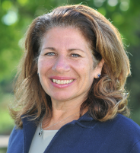 Christina Sopko is a Diversity, Equity, Inclusion, and Belonging Coordinator and middle school English teacher at Far Hills Country Day School. She has expanded her educator experience with certificates in Diversity and Inclusion from Cornell University and Mind, Brain, Education practice through the Center for Transformative Teaching and Learning. Christina has extensive experience presenting and participating in Mindfulness, Wellness, and DEIB workshops.
Christina Sopko is a Diversity, Equity, Inclusion, and Belonging Coordinator and middle school English teacher at Far Hills Country Day School. She has expanded her educator experience with certificates in Diversity and Inclusion from Cornell University and Mind, Brain, Education practice through the Center for Transformative Teaching and Learning. Christina has extensive experience presenting and participating in Mindfulness, Wellness, and DEIB workshops.
Target Audience: Early Childhood and Lower School teachers, Middle School teachers, Upper School teachers, Administrators, School Counselors and Psychologists, Learning Support staff, Deans of Students
Presented by:
Liz Koster, Middle School Counselor, The Baldwin School
Description:
This session explores how anti-fatness impacts both individual and public health. Participants will challenge common health standards and learn about body neutrality as a way to create more inclusive practices in their personal and professional lives. The goal is to foster a broader understanding of wellness that focuses on health beyond appearance.
About the Presenter:
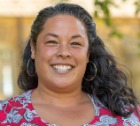 Liz Koster is the Middle School Counselor at The Baldwin School in Bryn Mawr, PA, with sixteen years of experience in both public and independent schools. She uses a relational approach to create an environment where people feel empowered to explore challenges. Liz values vulnerability, connection, and play as key components of her work, partnering with teachers, coaches, and community organizations to support students in need. She is a strong advocate of the growth mindset, often using phrases like “yes, and” and “not yet” to encourage resilience. Liz holds a B.A. in Psychology from Haverford College and a M.S. in Social Work from the University of Pennsylvania. Outside of work, she enjoys yoga, puzzling, and origami—a passion recently featured in Hulu's Only Murders in the Building.
Liz Koster is the Middle School Counselor at The Baldwin School in Bryn Mawr, PA, with sixteen years of experience in both public and independent schools. She uses a relational approach to create an environment where people feel empowered to explore challenges. Liz values vulnerability, connection, and play as key components of her work, partnering with teachers, coaches, and community organizations to support students in need. She is a strong advocate of the growth mindset, often using phrases like “yes, and” and “not yet” to encourage resilience. Liz holds a B.A. in Psychology from Haverford College and a M.S. in Social Work from the University of Pennsylvania. Outside of work, she enjoys yoga, puzzling, and origami—a passion recently featured in Hulu's Only Murders in the Building.
Target Audience: Middle School teachers, Upper School teachers, School Counselors and Psychologists
Presented by:
Olga Anagnostis, Student Assistance Counselor, Villa Walsh Academy
Description:
High school is often the most challenging time of a young woman's life. As counselors, we often work with students who are struggling to find "their people" and often find themselves in friendships that are unequal and unhealthy. So what is the solution? We can't always "fix" the "mean girls". We can try to work with them and guide them, but that doesn't solve the root of the problem. We (counselors, families, friends, support systems) need to help these students to find their inner strength and empower them to identify what it is that they deserve in a friendship. We need to teach them how to advocate for themselves in all aspects of life, to set boundaries in all relationships, and to recognize their personal worth. This session will not solve the problems of the world, but it will be a great first step towards guiding our young female students.
About the Presenter:
Olga is a Licensed Associate Counselor in the state of NJ. She graduated with her Master's Degree in Clinical Mental Health Counseling from Fairleigh Dickinson University. She currently works as the Student Assistance Counselor at Villa Walsh Academy, an all-girls Catholic school in Morristown, NJ. Having attended an all-girls school herself, Olga feels particularly connected to and protective of this population. Olga is also the author of a children's book, and enjoys spending time with her family.
Target Audience: Middle School teachers, Upper School teachers, Administrators, School Counselors and Psychologists, Learning Support staff, Deans of Students, Health teachers
Presented by:
Tina Yen, Upper School Assistant Director
Juliana Morrissey, Middle School Assistant Director
Joanna Upmeyer, Associate Director of College Guidance, 9th Grade Dean
Abington Friends School
Description:
Working “WITH” is fundamental to restorative practices. Restorative approaches to community wellbeing requires us to examine our relationships with ourselves as practitioners, and with students, colleagues, and families. What are the many ways we can get creative in our work “WITH” others to create and strengthen relationships, community, belonging, and wellbeing? In this session, we will provide a framework for implementing restorative practices, consider the value of intergenerational learning opportunities across grade level divisions, learn about student engagement in the process of expanding restorative approaches, and explore how restorative practices can transform school culture. The workshop will provide a case study for those considering restorative practice implementation from the everyday classroom to policy changes that impact school climate.
About the Presenter:
Tina is the Assistant Director of the Upper School at Abington Friends School. She recently completed the Friends Council on Education's Leadership Institute, working on restorative practices in student engagement for her action research project, and has also finished a graduate certificate from the International Institute of Restorative Practices. When she's not thinking about community building at school, Tina enjoys cooking for others, oil painting, and being a dog mom.
Target Audience: Upper School teachers, Administrators, School Counselors and Psychologists, Deans of Students
Presented by:
Rob Leather, Health, Wellness and Physical Education Department Chair
Varsay Lewis, Upper School Counselor
Montclair Kimberley Academy
Description:
At MKA, cultivating resilience and promoting help-seeking behavior is essential for fostering student well-being and academic success. This transformation can be achieved through the proactive involvement of school counselors, who provide essential support and guidance, helping students navigate challenges and develop coping strategies. The health and wellness department at MKA plays a crucial role by integrating resilience training into the curriculum, equipping students with the skills to manage stress and adversity effectively. Furthermore, a strong commitment from administrators is vital, as they can create a supportive environment that prioritizes mental health and encourages open dialogue about seeking help. Together, these elements can create a holistic approach that empowers students to thrive both academically and personally. In our presentation, we will talk about how we accomplished this task starting almost a decade ago. And how you can implement a program that fits your school’s community.
About the Presenters:
Robert Leather attended the University of Birmingham in the UK where he graduated with a first-class degree, which is only received by the top fifth percentile in a class. Robert comes to MKA after receiving his master’s degree at Montclair State University, serving as a program director and coach for 10 years, and working as an adjunct professor at MSU. Additionally, Robert has published a book called "World Class Coaching" (May 2011) and a research paper pertaining to sports programs and children with autism. Robert is an avid sports fan; he has a passion for soccer and seeing young people develop life skills through sports and maximize their potential. Even when he is not teaching/coaching he still stays active by playing golf and taking part in cross fit programs.
Prior to coming to MKA, Varsay Lewis worked at Camden Catholic School High School for nine years. Varsay was born in Germany to Liberian parents and was a Liberian citizen until 22 when he became a naturalized citizen of the US. He is an avid soccer fan whose teams are Arsenal and Bayern Munchen, plays the harmonica, loves to cook, and is a world traveler. He is also a huge Philadelphia sports fan, especially of the World Champion Philadelphia Eagles!
Target Audience: Early Childhood and Lower School teachers, Middle School teachers, Upper School teachers, Administrators, School Counselors and Psychologists, Learning Support staff, Deans of Students
Presented by:
Michael Berezny, Middle School Math Teacher
Description:
In this session, learn how to build a classroom of excellence where students develop a positive mindset, take ownership of their learning, and hold themselves to higher standards. Using practical strategies rooted in Positive Psychology and High-Performance Habits, you'll discover how to instill focus, intrinsic motivation, and self-discipline in your students. Equip them with the tools to excel both academically and personally, ensuring they develop the character and resilience needed to thrive inside and outside the classroom.
About the Presenter:
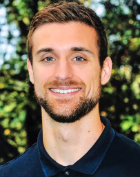 Michael Berezny is a Middle School Math Teacher at Rutgers Prep, teaching Pre-Algebra and Algebra 1. With 11 years of experience, he’s also a certified mindset coach in positive psychology and high-performance coaching. Michael is driven by a passion for helping students reach their full potential, build confidence, and embrace a growth mindset. His unique teaching style incorporates challenging math puzzles and critical thinking to teach students how to think, not just what to think. Through “Mindset Mondays” and psychology-infused lessons, he inspires lasting success both in and out of the classroom.
Michael Berezny is a Middle School Math Teacher at Rutgers Prep, teaching Pre-Algebra and Algebra 1. With 11 years of experience, he’s also a certified mindset coach in positive psychology and high-performance coaching. Michael is driven by a passion for helping students reach their full potential, build confidence, and embrace a growth mindset. His unique teaching style incorporates challenging math puzzles and critical thinking to teach students how to think, not just what to think. Through “Mindset Mondays” and psychology-infused lessons, he inspires lasting success both in and out of the classroom.
Target Audience: Administrators, all staff. A financial wellness program impacts every employee.
Presented by:
Robert Gibson, Managing Director - Philadelphia at Pentegra
Connor Scherzer, Consultant, at World Investment Advisors
Description:
The presentation will focus, specifically, on the critical role that financial wellness programs play in the workplace. Financial wellness is a topic that increasingly lands on the agenda of organizations and appeals to a broad range of professionals. According to the John Hancock 2023 Financial Wellness Survey, employee financial stress alone may cost employers upwards of $1,950.00 per employee per year in lost productivity and absenteeism! Leaning on the theme of ""wellness"" - financial wellness benefits can help employees feel more in control of their finances, which can positively impact their overall well-being. In today’s competitive employment environment, it’s critical for organizational leaders to take a proactive approach to drive institutional success while maintaining your focus on people. You understand that a successful organization is powered by happy, healthy, productive employees. Your benefits package is a critical component of attracting and retaining talent. A financial wellness program is an important piece to round-out a holistic benefits package.
About the Presenters:
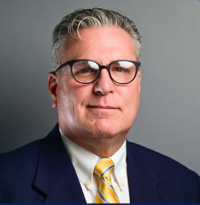 Robert Gibson leads World Investment Advisors Philadelphia office and is responsible for the development and oversight of its institutional consulting business for corporate, not-for-profit, educational and governmental retirement plans. Bob has earned the Certified Plan Fiduciary Advisor (CPFA®) designation, has extensive experience in finance, including over 20 years in the retirement plan industry. He incorporates retirement plan fiduciary investment advisory and consulting services with employee financial wellness to promote improved financial outcomes for plan sponsors and their employees. Bob has worked with plans of all sizes and complexities, including 401(k), 403(b), defined benefit and non-qualified deferred compensation plans. In total, Bob has worked with retirement plan sponsors maintaining over $3 billion in retirement plan assets. Bob graduated with a Finance Degree from St. Joseph’s University, in Philadelphia, in 1988. He resides in Phoenixville, PA with his wife, Eileen, where they raised three children.
Robert Gibson leads World Investment Advisors Philadelphia office and is responsible for the development and oversight of its institutional consulting business for corporate, not-for-profit, educational and governmental retirement plans. Bob has earned the Certified Plan Fiduciary Advisor (CPFA®) designation, has extensive experience in finance, including over 20 years in the retirement plan industry. He incorporates retirement plan fiduciary investment advisory and consulting services with employee financial wellness to promote improved financial outcomes for plan sponsors and their employees. Bob has worked with plans of all sizes and complexities, including 401(k), 403(b), defined benefit and non-qualified deferred compensation plans. In total, Bob has worked with retirement plan sponsors maintaining over $3 billion in retirement plan assets. Bob graduated with a Finance Degree from St. Joseph’s University, in Philadelphia, in 1988. He resides in Phoenixville, PA with his wife, Eileen, where they raised three children.
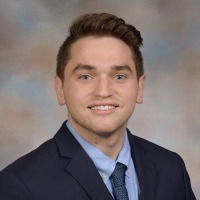 Connor Scherzer has been working in the Financial Services industry for his entire professional career. Prior to joining World Investment Advisors in the summer of 2022, Connor served as the Regional Director - Retirement Sales Pacific Northwest for a retirement plan provider. Connor holds his Series 65 license. He currently leads business development operations for the NY Metro team and works with clients on implementing World’s Financial Wellness Program for employees: SMARTMap®️. Connor attended Clemson University and graduated with a degree in Economics in 2019. Connor currently resides in Stamford, CT, with his girlfriend Lauren and their dog, Chloe. When he’s not working there’s a good chance you will find him at a Giants or Rangers game, or in his perfect world – down at the Jersey Shore.
Connor Scherzer has been working in the Financial Services industry for his entire professional career. Prior to joining World Investment Advisors in the summer of 2022, Connor served as the Regional Director - Retirement Sales Pacific Northwest for a retirement plan provider. Connor holds his Series 65 license. He currently leads business development operations for the NY Metro team and works with clients on implementing World’s Financial Wellness Program for employees: SMARTMap®️. Connor attended Clemson University and graduated with a degree in Economics in 2019. Connor currently resides in Stamford, CT, with his girlfriend Lauren and their dog, Chloe. When he’s not working there’s a good chance you will find him at a Giants or Rangers game, or in his perfect world – down at the Jersey Shore.
Target Audience: Middle School teachers, Upper School teachers, Administrators, School Counselors and Psychologists, Learning Support staff, Deans of Students
Presented by:
Patricia Gagnon, Chief Experience Officer at Intellispark
Bridget Londay, Director, Health & Wellness, Packer Collegiate Institute
Frederick Pratt, Director of Student Services & Clinical Counselor, Friends' Central School
Designing and implementing an integrated student support program that effectively serves the whole child is truly a craft – part art and part science. Key ingredients are essential for success: a timely and efficient way to understand a student's personal goals and needs across numerous facets, and a means to address those diverse needs in an integrated manner that feels seamless and contextualized for the student, their family, and ideally, your staff. Our two presenters have each implemented robust student support programs utilizing such essential tools and systems, but with a distinct flavor that reflects their school's culture. Both have leveraged technology to proactively solve problems before they become crises, freeing up capacity to tackle major issues when they arise.
Whether you are still crafting your integrated student support team or are already deep in the process, you will hear what our panelists consider essential ingredients, how they procured them, how and when they added those ingredients to the mix, and the critical role of regular assessments. Next, you’ll hear about some of their unique variations focused on student well-being, tailored to meet the specific contexts of each community. These include deep integration with restorative practices, a foundational commitment to student health and wellness, and a dedication to elevating transparency and trust among school staff and the broader community in service to well-being for all. In small group discussions, you’ll be asked to consider and articulate the key ingredients you have, those you still need to procure, and what constitutes your special approach given your school culture, vision, and the unique capabilities of your broader team.
About the Presenters:
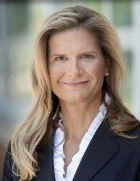 Patricia Gagnon (she/her) is the chief experience officer at Intellispark. A passionate educator and innovator, she focuses on sparking student drive and developing transformative solutions for students, parents, and education professionals. With executive experience in product strategy for education technology and consumer products, Patricia was previously the senior vice president and general manager of Naviance by Hobsons and vice president of product management at K12, Inc. She also spent seven years at Unilever in corporate finance and global brand management. Patricia began her career as a public school administrator and teacher. She holds a BA in Classics and English from Dartmouth and an MBA from MIT Sloan.
Patricia Gagnon (she/her) is the chief experience officer at Intellispark. A passionate educator and innovator, she focuses on sparking student drive and developing transformative solutions for students, parents, and education professionals. With executive experience in product strategy for education technology and consumer products, Patricia was previously the senior vice president and general manager of Naviance by Hobsons and vice president of product management at K12, Inc. She also spent seven years at Unilever in corporate finance and global brand management. Patricia began her career as a public school administrator and teacher. She holds a BA in Classics and English from Dartmouth and an MBA from MIT Sloan.
 Bridget Londay (she/her), the Director of Health and Wellness at The Packer Collegiate Institute. Bridget's role involves teaching, health programming, and collaborating with team members across the administration and Health and Wellness team. She was drawn to Packer for its mission to educate globally minded students and appreciates the school's focus on the whole child. Bridget's career began as an ER nurse, with international experiences in Ecuador, Kenya, and South Africa. She holds a BSN from the University of Nebraska Medical Center and a Masters in Public Health from NYU. Outside of work, Bridget enjoys cooking, traveling, and exploring NYC with her family.
Bridget Londay (she/her), the Director of Health and Wellness at The Packer Collegiate Institute. Bridget's role involves teaching, health programming, and collaborating with team members across the administration and Health and Wellness team. She was drawn to Packer for its mission to educate globally minded students and appreciates the school's focus on the whole child. Bridget's career began as an ER nurse, with international experiences in Ecuador, Kenya, and South Africa. She holds a BSN from the University of Nebraska Medical Center and a Masters in Public Health from NYU. Outside of work, Bridget enjoys cooking, traveling, and exploring NYC with her family.
 Frederick Pratt (he/him) is the Director of Student Services at Friends' Central School. His role involves leading and collaborating with 10 team members across three divisions (LS, MS, US). Drawn to FCS for its mission to "peacefully transform the world," he values the school's commitment to anti-bias/anti-racist education. Frederick's career began in higher education at MIT, with international experiences in Bolivia, Brazil, and Peru, and as a social worker in NYC, Washington DC, and Philadelphia. He is a doctoral candidate with postgraduate degrees in Theology, Counseling, and Restorative Practices. Outside of work, Frederick enjoys traveling with his wife and German Shepherd Dog.
Frederick Pratt (he/him) is the Director of Student Services at Friends' Central School. His role involves leading and collaborating with 10 team members across three divisions (LS, MS, US). Drawn to FCS for its mission to "peacefully transform the world," he values the school's commitment to anti-bias/anti-racist education. Frederick's career began in higher education at MIT, with international experiences in Bolivia, Brazil, and Peru, and as a social worker in NYC, Washington DC, and Philadelphia. He is a doctoral candidate with postgraduate degrees in Theology, Counseling, and Restorative Practices. Outside of work, Frederick enjoys traveling with his wife and German Shepherd Dog.
THANK YOU TO OUR SPONSORS!
and To Our Preferred Sponsor
![]()
2024-25 professional development programs!
PROGRAM FEES
Member Schools - $150 per person
Act 48 Credits Available
• You may request credit up to 7 days after the event.
• Per the PA Department of Education, ADVIS is required to report your successful completion of Act 48 evaluation within 30 days of the event.
• Available to members only.
• Contact Candyce Wilson for more information.
ACCESSIBILITY
We strive to host inclusive, accessible events that enable all individuals, including individuals with disabilities, to engage fully. Please feel free to request an accommodation on the registration form. For inquiries about accessibility, please contact Membership and Outreach Manager Candyce Wilson. At least two weeks' advance notice will help us to provide seamless access.
EVENT CONTACTS
Dena Torino, ADVIS Director of Programming
Rachel Folan, NJAIS Associate Director for Programs & Strategic Initiatives



